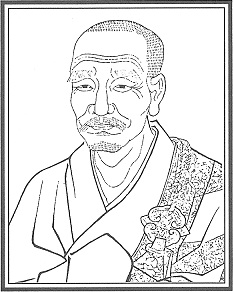|
 師生江夏。張氏。十九為大僧。參梁山。問如何是無相道場。山指觀音曰者是吳處士畫。師擬對。山急索曰者是有相底。那個是無相底。師有省。便禮拜。山曰何不道取一句。師曰道即不辭。恐上紙筆。山笑曰此語上碑去。在師神觀奇偉。童稚即日一食。住大陽。足不越限。脅不至席五十年。宋仁宗天聖五年丁卯七月十九以偈寄王曙侍郎。其略曰。 師生江夏。張氏。十九為大僧。參梁山。問如何是無相道場。山指觀音曰者是吳處士畫。師擬對。山急索曰者是有相底。那個是無相底。師有省。便禮拜。山曰何不道取一句。師曰道即不辭。恐上紙筆。山笑曰此語上碑去。在師神觀奇偉。童稚即日一食。住大陽。足不越限。脅不至席五十年。宋仁宗天聖五年丁卯七月十九以偈寄王曙侍郎。其略曰。
吾年八十五。修因至如此。
問我歸何處。頂相終難睹。
停筆而化。塔於本山。
註釋:
「師生江夏」,江夏是什麼地方?湖北。「張氏」,姓張的。「十九為大僧」,十九歲受具足戒。「參梁山」,參訪這個梁山,「問如何是無相道場」,問怎麼樣叫「無相」,沒有相的道場?
「山指觀音曰」,梁山指觀音就說:「者是吳處士畫」,吳處士是誰?吳道子。「師擬對」,這位警玄禪師,想一想,用什麼話來答覆。
「山急索曰」,梁山很快的就和他要答覆,說:「這是有相底」,這是有形象的,「哪個是無相底」,什麼叫無相?「師有省」,這位警玄禪師,他就開悟了,「便禮拜」,就拜這個梁山。
「山曰何不道取一句」,說:「你為什麼不說一句話呢?」
「師曰道即不辭」說:「我若道出來,我就不向你告辭了,告假了。」我要是有一句話說,我就不走了;若禮拜他就要走了。「恐上紙筆」,因為我怕說出來的話,你以筆寫到紙上就留了痕跡了。
「山笑曰」,這梁山就很高興,說「此語上碑去」,你說的這一句話「恐上紙筆」,這應該寫到碑上,應該把它立碑刻銘。
「在師神觀」,他這種樣子,他這種的形象,「奇偉」,很奇特,也很偉岸。「童稚即日一食」,在童子的時候,他就日中一食;「住太陽」,他住在太陽院,「足不越限」,他在那兒住,足總沒有出過門,沒有出過大門一步;「脅不至席」,他臥的時候,總是脅不至席。
不像我們這個果相,一天到晚總是去跑街市,晚上也跑出去。人家他連大門口都不出,你知道嗎?你半夜三更跑到街上去幹什麼?跑到街上去偷邋遢去。
「五十年」脅不至席,他有五十年之久的時間,脅不至席。「宋仁宗天聖五年」,在宋朝,仁宗年號叫「天聖」,五年的時候,「丁卯七月十九」日,「以偈寄王曙侍郎」,寫一首偈頌給當時一個侍郎,是一個很大的官,寄給他;「其略曰」,大略是這麼說的:「吾年八十五」,我已經活到八十五歲,「修因至如此」,我修的因就這樣子,「問我歸何處」,你要問我到什麼地方去,「頂相終難睹」,在這無見頂相誰也看不見的地方。我到什麼地方去?我到那個沒有罣礙的地方去。
「停筆而化」,把筆停住了,就這麼圓寂了,「塔於本山」。
待續
|
|
Text:
The Master came from the Zhang family of Jiangxia. At nineteen, he became a fully-ordained monk. He went to study under Master Liangshan, and asked the latter, “What is the Way-place of No Marks?”
Liangshan pointed at an image of Guanyin Bodhisattva, and said, “This is a picture painted by the recluse Wu.”
The Master was in the process of thinking up a reply, when Liangshan quickly asked him, “This is that which has marks. What is that which has No Marks?”
The Master had an awakening, and bowed to Liangshan. Liangshan remarked, “Why don’t you utter a single word?’
The Master replied, “It’s not that I am declining to speak, but I am afraid that what I say will be recorded on paper.”
Then Liangshan laughed and said, “What you’ve just said merits being inscribed on a stone tablet!”
The Master had a magnificent and awe-inspiring stature. From early youth, he adhered to the practice of eating only once a day. While living at Dayang (Great Sun) Monastery, his feet never stepped over the threshold, and for over fifty years his ribs never touched the mat. On the nineteenth day of the seventh month, in the cyclical year
ding mao, that is, the fifth year of the
Tiansheng reign period of the Emperor Renzong of the Song Dynasty, the Master sent a verse to the minister Wang Shu, the contents of which read:
In my eighty-five years,
The causes I have cultivated have brought me to this point.
You ask me where I’m about to return to:
The appearance of the summit is not easily visible.
At that point, his brush stopped, and he passed into the stillness. His
stupa was erected on that mountain.
Commentary:
The Master came from the Zhang family of Jiangxia. Master Jingxuan was born in the Zhang family of Jiangxia County, Hubei Province.
At nineteen, he became a fully-ordained monk. He received the complete precepts.
He went to study under Master Liangshan, and asked the latter, “What is the Way Place of No Marks?”
Liangshan pointed at an image of Guanyin Bodhisattva, and said, “This is a picture painted by the recluse Wu.”
The Master was in the process of thinking up a reply. Dhyana Master Jingxuan was pondering how to respond,
when Liangshan quickly asked him, “This is that which has marks. What is that which has No Marks?”
“The Master had an awakening, and bowed to Liangshan. He became enlightened at that very moment, and so he bowed to Dhyana Master Liangshan.
Liangshan remarked, “Why don’t you utter a single word? Why don’t you say something?”
The Master replied, “It’s not that I am declining to speak, but I am afraid that what I say will be recorded on paper.” Dhyana Master Jingxuan said, “If I had something to say, I would not leave.” His bowing meant that he was about to take his leave. He said, “I am afraid that if I were to say something, it would be recorded on paper, and traces would be revealed.”
Then Liangshan laughed and said, “What you’ve just said merits being inscribed on a stone tablet!” Dhyana Master Liangshan was very happy and replied, “What you have just said, ‘I am afraid that it would be recorded on paper,’ should be inscribed in stone.”
The Master had a magnificent and awe-inspiring stature. The appearance of this Dhyana Master was unusual. He was very majestic and impressive looking.
From early youth, he adhered to the practice of eating only once a day. While living at Dayang (Great Sun) Monastery, his feet never stepped over the threshold, and for fifty years his ribs never touched the mat. In his youth, he already ate only one meal a day at noon. While dwelling at Dayang Monastery, he never walked out of the gate – he never left the monastery. For fifty years, he never let his ribs touch the mat.
On the nineteenth day of the seventh month, in the cyclical year
ding mao, that is, the fifth year of the
Tiansheng reign period of the Emperor
Renzong of the Song Dynasty, the Master sent a verse to the minister Wang
Shu, who was a great official at that time,
the contents of which read: In my eighty-five years, the causes I have cultivated have brought me to this point. I have lived for eighty-five years, and the causes I have cultivated are just like this.
You ask me where I’m about to return to. The appearance of the summit is not easily visible. If you ask me where I am heading for, I am going to a place where the summit is not easy to see. Nobody can see it; I am going to the place of no-attachment.
At that point, his brush stopped, and he passed into the stillness. His stupa was erected on that mountain. Then he stopped writing with his brush, and passed into quiescence. His stupa was built near Dayang Monastery.
To be continued
|